Frenkie de Jong's Absence from Euro 2024
Frenkie de Jong, the pivotal 27-year-old Dutch midfielder who plies his trade at Barcelona, has been officially ruled out of Euro 2024 due to ongoing ankle injuries. This news arrives like a melancholy echo across the football community, especially given de Jong's indispensable role in the Netherlands' national squad. His struggles with ankle issues have been longstanding, beginning on March 3, and despite hopes for recovery, the injury lingers, forcing him out of one of the football calendar's most prestigious events.
Impact on the Netherlands' Squad
De Jong's absence leaves a glaring void in the heart of the Dutch midfield. With 54 international caps under his belt and two goals for his country, he has long been a linchpin for the Netherlands. His extensive international experience means he brings not just skill but also vital composure and leadership to the squad. The challenge now lies with head coach Ronald Koeman to identify and groom a suitable replacement for de Jong's irreplaceable presence during the tournament.
The Euro 2024 is set to take place in Germany, and the Netherlands are gearing up for high-stakes group stage matches against formidable teams like Poland on June 16, France on June 21, and Austria on June 25. The team had high expectations riding on de Jong, known for his vision, ball control, and playmaking abilities. His absence is a significant strategic blow, one that Koeman and his team need to navigate dexterously.
Potential Replacements: Who Will Step Up?
The search for de Jong's replacement is a focus for Koeman. Among the most likely candidates are Jerdy Schouten and Joey Veerman from PSV Eindhoven. Both players have showcased impressive performances at the club level and could bring fresh energy to the double-pivot role that de Jong would have occupied. Schouten is known for his defensive capabilities and ball distribution, while Veerman offers attacking dynamism and creativity.
Teun Koopmeiners from Atalanta is another strong contender. Koopmeiners has made a name for himself in Serie A with his all-around midfield prowess and tactical intelligence. His ability to contribute both defensively and offensively makes him a valuable asset. Additionally, there is the experienced Gini Wijnaldum, a former Liverpool star who commands respect and brings a wealth of experience. Wijnaldum’s versatility and familiarity with high-pressure situations could provide the stability needed in de Jong's absence.

The Journey of Frenkie de Jong
Born on May 12, 1997, in Gorinchem, Netherlands, Frenkie de Jong rose through the ranks of Willem II’s youth system before making his way to Ajax. His tenure at Ajax was marked by remarkable growth and development, swiftly making him one of Europe’s most sought-after young talents. Known for his exceptional dribbling, tactical acumen, and ability to control the tempo of a game, de Jong earned a high-profile move to Barcelona in 2019.
At Barcelona, de Jong has continued to flourish, adapting to La Liga's rigors and becoming a crucial figure in the team's midfield. His calm demeanor on the pitch, coupled with his technical brilliance, has made him a fan favorite and an integral part of the Blaugrana setup. His journey from a promising young player in the Eredivisie to a world-class midfielder at one of the biggest clubs globally is a testament to his talent and hard work.
Challenges Ahead for the Dutch Team
The Dutch squad faces a daunting task as they prepare for their Euro 2024 campaign without their star midfielder. The group stage matches are scheduled against Poland, France, and Austria, all of which are strong opponents. Without de Jong's creative presence in the midfield, the Netherlands will need to find alternative ways to break down defenses and control the game’s tempo.
A key aspect of the Netherlands' strategy will be to ensure that the chosen replacement can seamlessly fit into the role de Jong played. This transition must be handled with care to maintain the team’s overall balance. Koeman's tactical acumen and the ability of potential replacements to rise to the occasion will be crucial factors determining the Netherlands' success in the tournament.
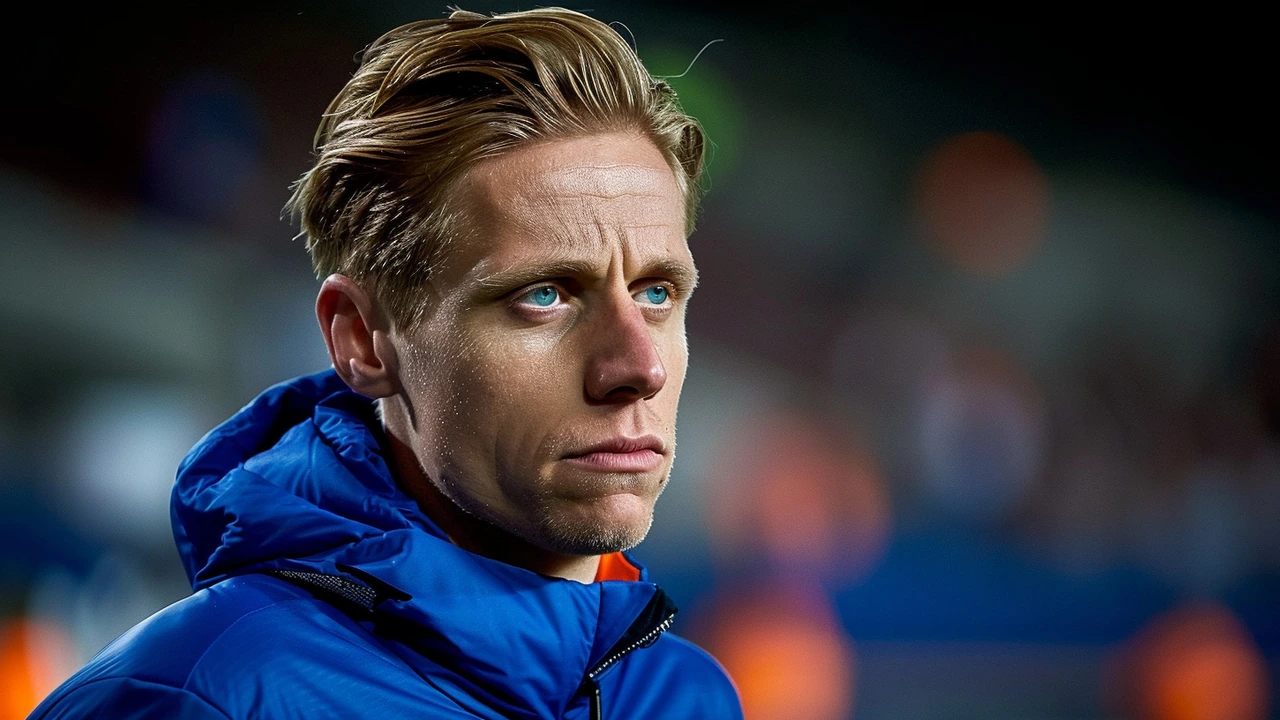
The Importance of Midfield Stability
In modern football, the midfield is often regarded as the engine room of a team, dictating the pace of play and linking the defense with the attack. De Jong's role in the Dutch midfield was critical in maintaining stability and transitioning play. His absence places added pressure on the remaining midfielders to step up and deliver consistent performances throughout the tournament.
The effectiveness of players like Jerdy Schouten, Joey Veerman, Teun Koopmeiners, and Gini Wijnaldum in stepping into de Jong’s shoes will be under intense scrutiny. Their ability to control possession, create opportunities, and support both the defensive and attacking phases of play will be paramount for the Dutch team’s aspirations in Euro 2024.
Looking Forward: Long-Term Implications
While the immediate focus is on Euro 2024, the implications of de Jong's absence extend beyond the tournament. It raises questions about the depth and resilience of the Dutch squad, highlighting the importance of nurturing and developing young talents who can step up when required. The experience gained by potential replacements during the tournament could be crucial for the Netherlands' future endeavors in international football.
For Frenkie de Jong, the focus will now shift to recovery and rehabilitation. The priority is to ensure that he returns to full fitness and can continue to contribute at the highest level for both club and country. His resilience and determination will be tested, but there is little doubt that he will come back stronger, ready to reclaim his place as one of the best midfielders in the world.
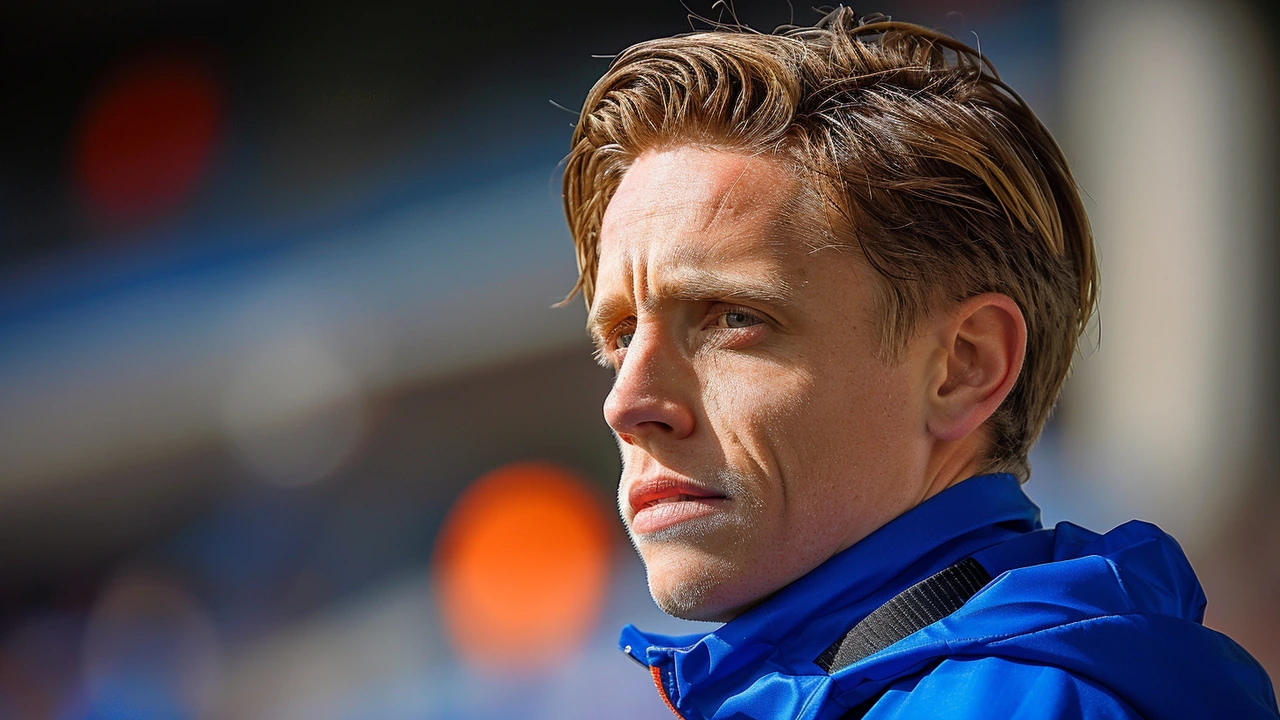
Conclusion: A Tough Road Ahead
Frenkie de Jong's absence from Euro 2024 is a significant blow to the Netherlands' ambitions. His persistent ankle injury has not only sidelined a key player but also raised the stakes for the entire squad. The onus is now on Ronald Koeman and his team to navigate this challenge and find the right balance to compensate for de Jong's absence. With crucial matches against Poland, France, and Austria on the horizon, the Dutch squad must rally together, adapt quickly, and showcase their resilience on one of football’s biggest stages.
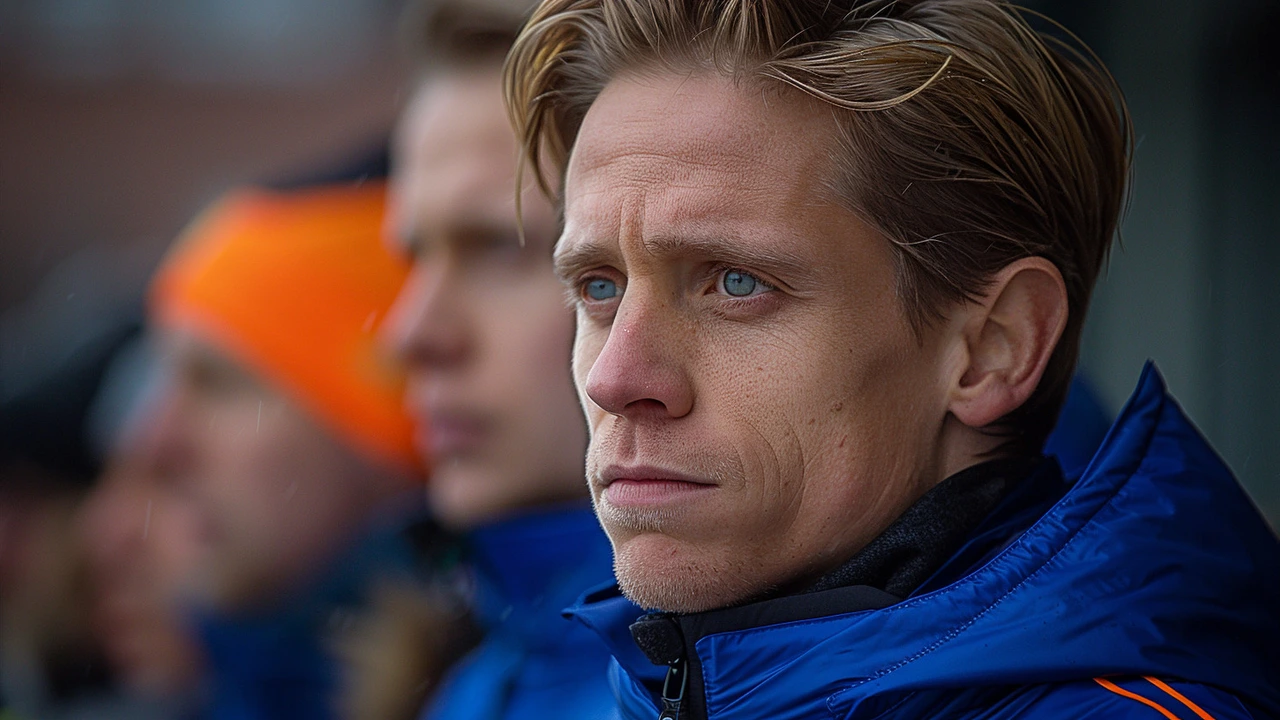
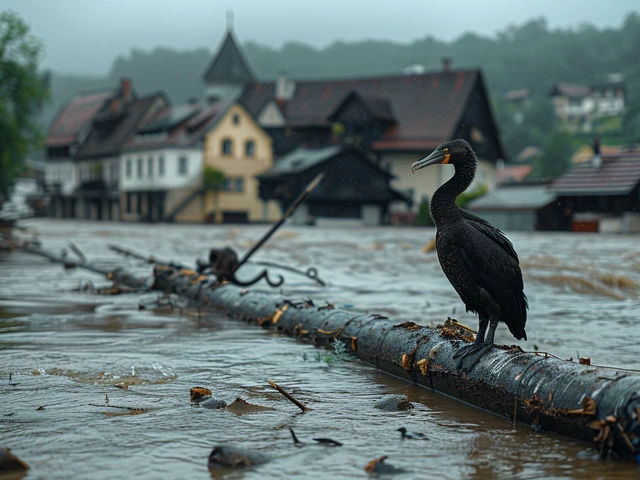
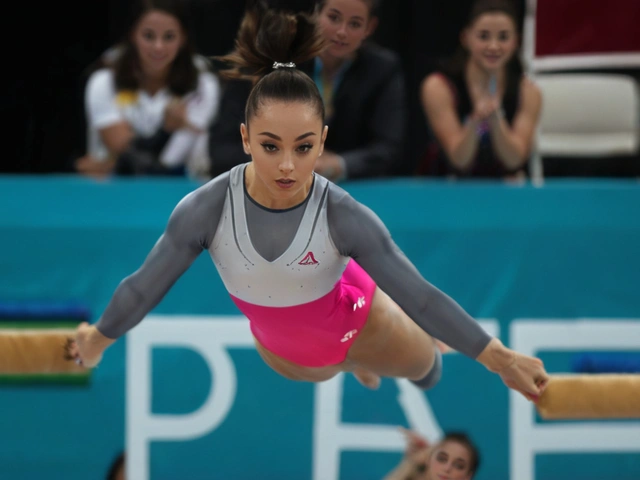
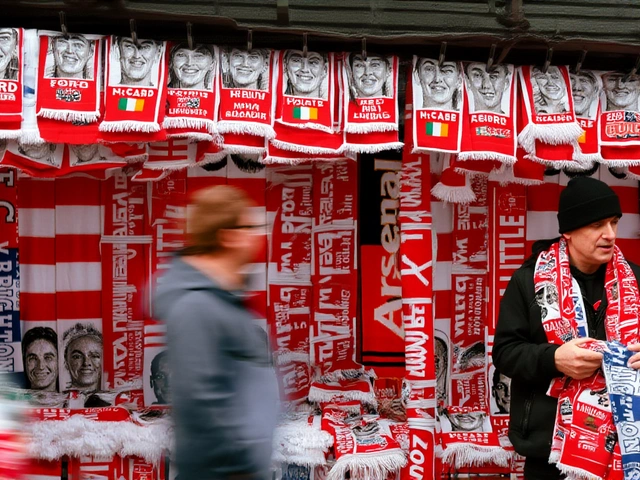
It's a real shame to see Frenkie de Jong miss Euro 2024, especially after the relentless work he’s put in at Barcelona and for the national side. The Dutch midfield has always thrived on his ability to glide through traffic and dictate tempo, a quality that can't be easily replaced. Historically, teams that lose a central pivot of his calibre often struggle to maintain balance between defense and attack. Koeman now faces the daunting task of reshaping his tactical setup while keeping the team's spirit intact. Players like Jerdy Schouten and Joey Veerman have shown promise, but they operate with different nuances compared to De Jong’s composure. Teun Koopmeiners could bring a blend of defensive grit and creative spark, yet integrating him into the double‑pivot will require time. Gini Wijnaldum, with his veteran experience, might serve as a stabilising force, but the lack of De Jong’s unique vision leaves a noticeable void. The upcoming group fixtures against Poland, France, and Austria will test the squad’s adaptability to this new configuration. If the Dutch can tighten their transition play and exploit set‑piece opportunities, they might still surprise opponents. However, the psychological impact of losing a player of De Jong’s stature cannot be underestimated. Fans will be looking for a collective uplift, and the midfielders will need to step up collectively. In training camps, the coaching staff should emphasise positional discipline to compensate for the lost fluidity. The injury also raises broader questions about the depth of the squad and the need to nurture the next generation of midfield talent. While De Jong focuses on rehabilitation, the nation hopes to see him back at full strength for future tournaments. In the meantime, the Dutch must rally, adapt, and prove that their footballing identity extends beyond a single player.
We all wish him a swift recovery.
Honestly, it's like the team just lost its golden ticket. De Jong was the glue that held everything together, and now Koeman has to scramble for a new glue. The media will love to speculate, but the real test is on the pitch. Hopefully the youngsters can rise to the occasion and fill the gap.
The absence of a player who controls space and tempo forces a philosophical shift in how we view team dynamics. Aggression in midfield can compensate, but only if paired with intelligent positioning. Koeman must balance risk and reward, lest the Dutch become predictable. It's a crucible for both tactics and character.
From a strategic standpoint, the loss of De Jong necessitates a recalibration of the central midfield hierarchy. The coaching staff will likely prioritize structured ball circulation to mitigate the creative vacuum. Maintaining composure under pressure will be essential for the Dutch. A disciplined approach could still yield positive outcomes.
De Jong's loss hurts the squad big tim.
De Jong's injury underscores how fragile even the most elite squads can be. While the Dutch have depth, replacing a player of his vision is not trivial. The emphasis should now shift to harnessing the versatility of players like Koopmeiners and Veerman. Their ability to transition quickly could offset the creative deficit. Moreover, pressing as a unit will help relieve pressure on the midfield. Koeman's experience will be vital in making swift tactical adjustments. The fans' morale will also play a role; a united front can inspire the team. Ultimately, resilience will define the Netherlands' Euro journey.
Yo, I feel that vibe! It's like the whole squad just got a speed bump, but we can still grind over it. Those young guns gotta bring that fire, no excuse. Let's cheer them on and see some magic happen on the field. Dutch pride never quits!
Wow!! That really hits home!!! De Jong's missing is a massive blow!!! But hey, the team can still rally!!! Let's keep the spirits high and support our lads!!!
From an inclusive perspective, we should view this setback as an opportunity for other midfield talents to step into the spotlight. The Netherlands have a rich pool of players who can adapt to different roles. It's crucial that the coaching staff provides clear guidance and confidence. By fostering a collaborative environment, the squad can maintain cohesion despite the loss. Moreover, the fans' support can act as an additional catalyst for performance.
Seriously, this is just another excuse for the Dutch to look weak. Throwing around buzzwords about "collaboration" won't change the fact that they lack a true playmaker. Their tactics are outdated, and no amount of morale will fix that. Koeman should have a plan, not these feel‑good speeches. It's plain and simple – they're doomed.
De Jong is missed.
Don't think so. Talent matters more than hype.
Look, the stats don't lie – the Dutch midfield has lost about 30% of its passing accuracy without De Jong. That kind of drop changes game dynamics dramatically. Still, if they tighten up defensively and use quick transitions, they can stay competitive. Keep an eye on how Veerman and Koopmeiners link up; they might just surprise everyone. Euro 2024 is full of twists, and the Netherlands could still pull off a upset.